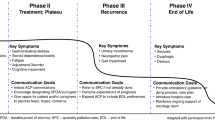Abstract
Primary tumors and metastatic involvement of the central nervous system (CNS) lead to a multitude of symptoms and care needs. Patients and caregivers struggle with physical and psychological impairments, a shortened life expectancy and diverse palliative care needs. This study assesses the symptom burden and palliative care needs of patients with primary brain tumors and with metastatic brain tumors requiring inpatient hospital care. It is a retrospective analysis of patients with primary CNS tumors or cerebral metastases over a 6 month period. The data analysed included physical symptom burden and end of life care decisions such as health care proxy, transition to hospice and do-not-resuscitate orders. Hundred and sixty eight patients were included. The most common symptoms were gait impairment (65.5 %), cognitive/personality change (61.9 %), motor deficits (58.3 %), seizures (57.1 %) and delirium (27.4 %). Of the patients that died, 79 % had an appointed health care proxy, 79 % had hospice discussions, 70 % had a do-not-resuscitate order and 24 % received cancer directed therapy in the last month of life. There is a role for more aggressive palliative care support in patients living with primary or metastatic brain tumors.


Similar content being viewed by others
References
Taillibert S, Laigle-Donadey F, Sanson M (2004) Palliative care in patients with primary brain tumors. Curr Opin Oncol 16:587–592
Taillibert S, Delattre JY (2005) Palliative care in patients with brain metastases. Curr Opin Oncol 17:588–592
Batchelor TT, Byrne TN (2006) Supportive care of brain tumor patients. Hematol Oncol Clin North Am 20:1337–1361
Catt S, Chalmers A, Fallowfield L (2008) Psychosocial and supportive-care needs in high-grade glioma. Lancet Oncol 9:884–891
Jenkinson MD, Haylock B, Shenoy A, Husband D, Javadpour M (2011) Management of cerebral metastasis: evidence-based approach for surgery, stereotactic radiosurgery and radiotherapy. Eur J Cancer 47:649–655
Pignatti F, van den Bent M, Curran D et al (2002) Prognostic factors for survival in adult patients with cerebral low-grade glioma. J Clin Oncol 20:2076–2084
Puduvalli VK, Hashmi M, McAllister LD et al (2003) Anaplastic oligodendrogliomas: prognostic factors for tumor recurrence and survival. Oncology 65:259–266
Stupp R, Mason WP, van den Bent MJ et al (2005) Radiotherapy plus concomitant and adjuvant temozolomide for glioblastoma. New Engl J Med 352:987–996
Pace A, Di Lorenzo C, Guariglia L, Jandolo B, Carapella CM, Pompili A (2009) End of life issues in brain tumor patients. J Neurooncol 91:39–43
Sizoo EM, Braam L, Postma TJ et al (2010) Symptoms and problems in the end-of-life phase of high-grade glioma patients. Neuro Oncol 12:1162–1166
Lipsman N, Skanda A, Kimmelman J, Bernstein M (2007) The attitudes of brain cancer patients and their caregivers towards death and dying: a qualitative study. BMC Palliat Care 6:7
Junck L (2004) Supportive management in neuro-oncology: opportunities for patient care, teaching, and research. Curr Opin Neurol 17:649–653
Pace A, Metro G, Fabi A (2010) Supportive care in neurooncology. Curr Opin Oncol 22:621–626
Faithfull S, Cook K, Lucas C (2005) Palliative care of patients with a primary malignant brain tumour: case review of service use and support provided. Palliat Med 19:545–550
Watanabe K, MacLeod R (2005) Care for dying patients with primary malignant brain tumor. Neurol Med Chir 45:657–659
Talacchi A, Santini B, Savazzi S, Gerosa M (2010) Cognitive effects of tumour and surgical treatment in glioma patients. J Neurooncol 103(3):541–549
Correa DD (2010) Neurocognitive function in brain tumors. Curr Neurol Neurosci Rep 10:232–239
Triebel KL, Martin RC, Nabors LB, Marson DC (2009) Medical decision-making capacity in patients with malignant glioma. Neurology 73:2086–2092
Bosshard G, Nilstun T, Bilsen J et al (2005) Forgoing treatment at the end of life in 6 European countries. Arch Intern Med 165:401–407
The SUPPORT Principal Investigators (1995) A controlled trial to improve care for seriously ill hospitalized patients. The study to understand prognoses and preferences for outcomes and risks of treatments (SUPPORT). JAMA 274:1591–1598
Dorman S, Hayes J, Pease N (2009) What do patients with brain metastases from non-small cell lung cancer want from their treatment? Palliat Med 23:594–600
Becker G, Hatami I, Xander C et al (2011) Palliative cancer care: an epidemiologic study. J Clin Oncol 29:646–650
Oberndorfer S, Lindeck-Pozza E, Lahrmann H, Struhal W, Hitzenberger P, Grisold W (2008) The end-of-life hospital setting in patients with glioblastoma. J Palliat Med 11:26–30
Addington-Hall J, Altmann D (2000) Which terminally ill cancer patients in the United Kingdom receive care from community specialist palliative care nurses? J Adv Nurs 32:799–806
Carver AC, Vickrey BG, Bernat JL, Keran C, Ringel SP, Foley KM (1999) End-of-life care: a survey of US neurologists’ attitudes, behavior, and knowledge. Neurology 53:284–293
Acknowledgments
Thank you to John Francavilla and Kristin Herman for their assistance with the database information. This research was not funded by any granting agency or other funding source.
Conflict of interest
Dr. Gofton and Dr. Graber both receive fellowship funding from Memorial Sloan-Kettering Cancer Center. Dr. Carver has nothing to disclose. No funding was received for this project.
Author information
Authors and Affiliations
Corresponding author
Rights and permissions
About this article
Cite this article
Gofton, T.E., Graber, J. & Carver, A. Identifying the palliative care needs of patients living with cerebral tumors and metastases: a retrospective analysis. J Neurooncol 108, 527–534 (2012). https://doi.org/10.1007/s11060-012-0855-y
Received:
Accepted:
Published:
Issue Date:
DOI: https://doi.org/10.1007/s11060-012-0855-y



